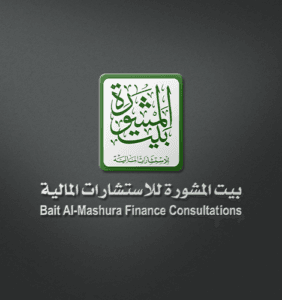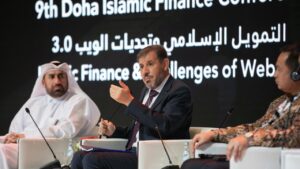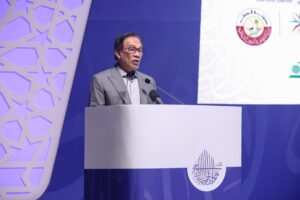Under the patronage of His Excellency Sheikh Mohammed bin Abdulrahman Al Thani – Prime Minister and Minister of Foreign Affairs, the official sponsorship of the “Ministry of Commerce and Industry”, the strategic partnership of “Dukhan Bank”, the Diamond sponsorship of “ General Directorate of Endowments and Islamic Affairs”, and the bronze sponsorship of “Qatar Financial Centre” “Bait Al-Mashura Finance Consultations” has organized the 10th Doha Islamic Finance Conference which was held in Doha, Qatar on Tuesday 17 Sha’ban 1445 AH corresponding to February 27, 2024 AD, entitled “Towards Islamic Finance 2.0: Fusion of Principles with Technology“.
The Doha Islamic Finance Conference set the stage for transformative discussions on Islamic finance, reflecting Qatar’s unwavering commitment to advancing the sector. Stay tuned for our next post, where we will explore the key themes and discussions that emerged from this groundbreaking event in our next post.
Unveiling Key Themes from the 10th Doha Islamic Finance Conference
As the 10th Doha Islamic Finance Conference unfolded, it brought to light three pivotal themes that are transforming the Islamic finance landscape. This part of our blog series delves into the core discussions and themes explored, providing insights into the future direction of the sector.
1. Shariah Governance and Smart Technology
The first theme addressed the changing landscape of Shariah governance in the era of smart technology. Proposals were made to redefine legal competence to encompass robots and electronic trading agents, paralleling non-human financial entities in Islamic jurisprudence. While AI integration into Islamic financial systems offers promise, caution was advised regarding religious rulings. Tools like ChatGPT can support but should not replace human expertise in issuing fatwas. Additionally, the modernization of endowment management through AI was emphasized to enhance efficiency and governance.
2. Impact of Latest Technologies on Islamic Financial Institutions
This theme examined how advanced technologies are transforming Islamic financial institutions. Natural Language Processing (NLP) emerged as a key driver for improving financial products and customer service. The conference advocated for collaboration between Islamic financial institutions and tech companies to foster innovation. AI-powered Shariah audit analytics were highlighted for enhancing compliance processes through real-time monitoring. Generative AI was discussed for revolutionizing decision-making and risk management while adhering to Islamic finance principles. The need to support big data initiatives in Islamic finance was also underscored.
3. Islamic Finance Ethics in the Hues of Smart Systems
The final theme focused on the intersection of ethics, technology, and finance within Islamic principles. Discussions highlighted how AI advancements can align with Islamic finance ethics to enhance integrity and transparency, attracting customers and promoting sustainable growth. The importance of balancing data sharing with privacy protection was emphasized, advocating for strict regulations and ethical awareness in data management. The conference laid out a roadmap for integrating technology with core ethical values, setting the stage for Islamic Finance 2.0.
These themes underscore the dynamic nature of Islamic finance and the innovative approaches needed to address emerging challenges. In our next post, we will dive into the key recommendations and conclusions drawn from the conference, highlighting actionable strategies for the future of the sector.
Recommendations and Future Directions from the 10th Doha Islamic Finance Conference
Building on the discussions and themes from the 10th Doha Islamic Finance Conference, this concluding part of our series emphasizes the key recommendations and conclusions that emerged. These insights are crucial for guiding the future of Islamic finance towards enhanced innovation and compliance.
- Legal Competence of AI: Robots and electronic trading agents could be considered legally competent and financially liable, akin to non-human entities like funds in Islamic jurisprudence.
- Data Sharing and Privacy Protection: Legislation must enforce strict regulations to safeguard privacy, while organizations should enhance expertise to ensure individual rights and public order.
- AI in Religious Practices: While AI can assist in Islamic finance, it should not replace human expertise in issuing fatwas, which require interpretive skills and contextual understanding.
- Enhanced Shariah Audit with AI: AI can improve efficiency and transparency in Shariah audits through predictive analytics and automated reporting.
- NLP for Product Development: Natural Language Processing can enhance financial product creation and customer service, emphasizing collaboration between financial institutions and tech firms.
- Ethical AI Integration: AI should align with Islamic finance ethics to strengthen transparency and attract customers, while machine learning can revolutionize decision-making and fraud detection.
The recommendations from the 10th Doha Islamic Finance Conference provide a strategic roadmap for the future of Islamic finance, integrating innovation with adherence to Shari’ah principles. Looking ahead, these insights will undoubtedly propel the industry to new levels of excellence and compliance. All praise is due to Allah, and may the momentum generated by this conference continue to inspire progress and success in Islamic finance.






